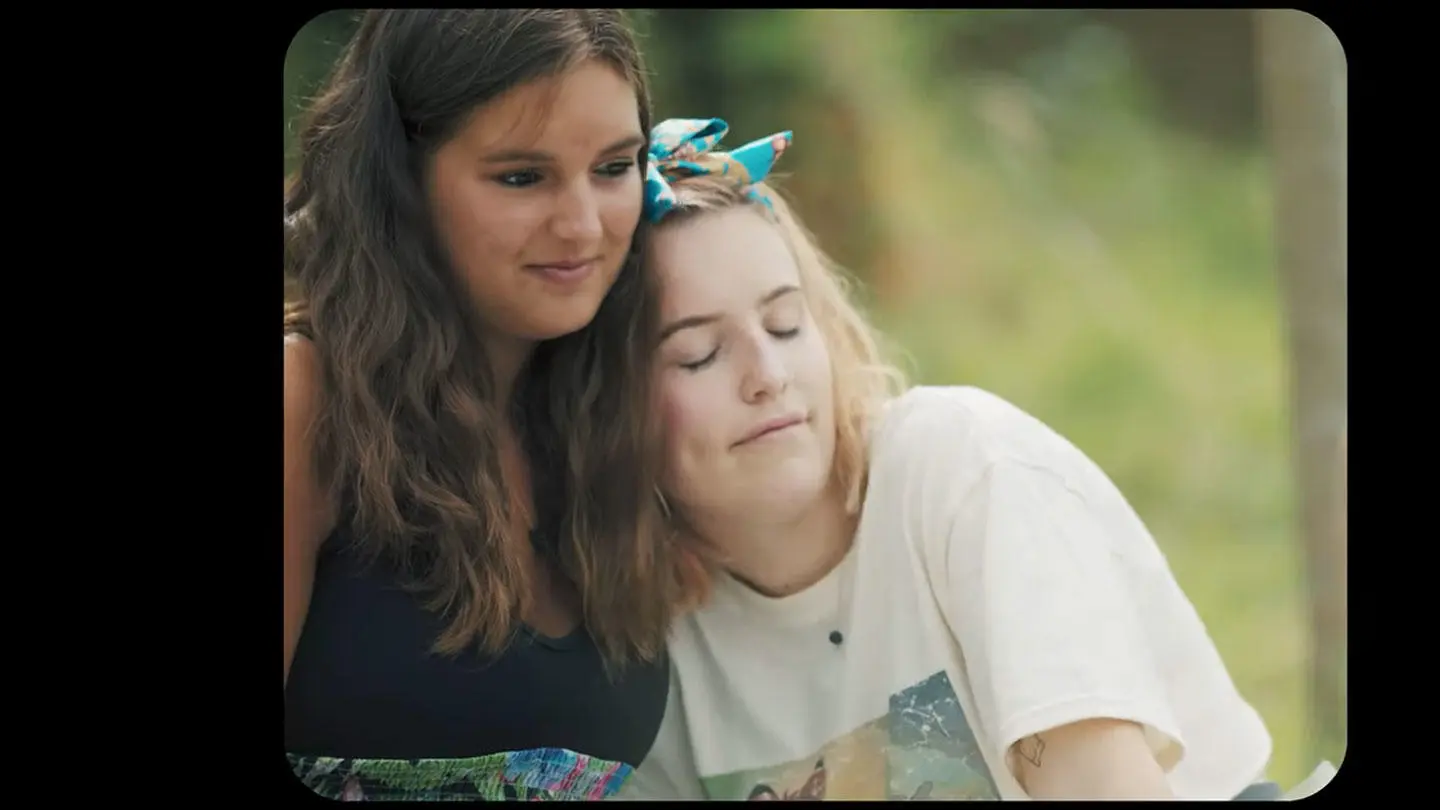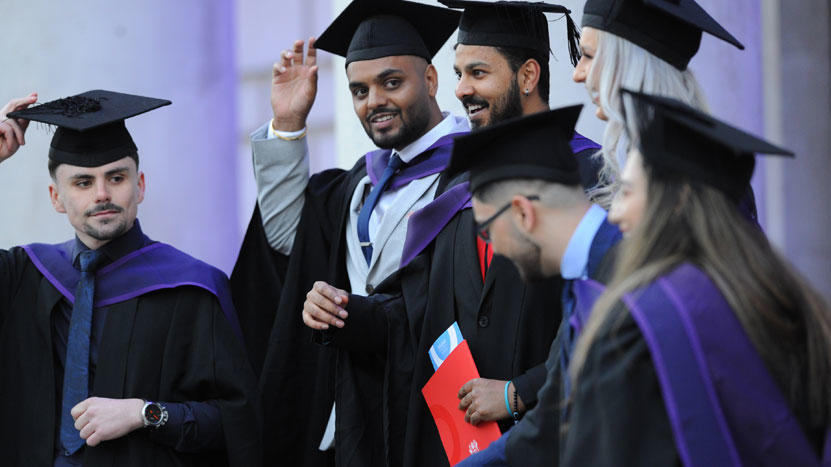MAFilm Production
Apply direct
- 1 year full-time
- 2 years part-time
Why study a film production master's degree at Solent University
Learn advanced filmmaking techniques and improve your portfolio by working in professional studios and collaborating with expert tutors on a range of projects.
- 0thUK uni for sustained employment (Longitudinal Educational Outcomes, 2022)
- £0minvested in our campus estate and facilities in the last five years
- You'll study fiction and non-fiction film making techniques enabling you to develop your own unique style of cinema.
- You can gain experience with our in-house production agencies - Solent Productions and Solent TV, enabling you to enhance your professional portfolio.
- Free access to extensive professional-grade film-making equipment including industry-standard cinema cameras and lenses, professional lighting and audio equipment, colour grading suite, and Solent Media Academy.
- The course will equip you with essential research and academic skills, which could help you pursue a PhD or an academic career
- Free film career consultation is delivered by our careers advice service, Solent Futures, which is available to all Solent students and graduates for life, helping you to progress in your current career or discuss options for a change in career.
- This course is eligible for a Postgraduate Master's student loan from Student Finance England and can be used to cover costs (ie, accommodation, tuition fees) associated with postgraduate studies (it was up to £12,167 for 2023 entry).
- Every student at Solent University will also have the option to study an additional Certificate in Practical Artificial Intelligence qualification alongside their course. Free of charge, the course ensures you'll be prepared for a fantastic and varied career after graduation.
Course overview
This exciting course focuses on independent filmmaking and current practices in the film industry. Students will experiment with creative ideas from the outset, taking advantage of our industry-standard facilities, training and equipment.
Along the way students will be challenged to develop their own personal style of filmmaking, exploring new ideas and collaborating with other postgraduate students. Up-to-the-minute teaching and instruction help students to build on these skills and work towards their chosen career.
Students studying in the TV, film and media production subject area benefit from a schedule of high calibre guest speakers and visiting fellows. Recent talks have been given by Paul Franklin (Oscar winner for visual effects on Inception) and Brian Tufano (cinematographer on Trainspotting, Quadrophenia and Billy Elliot).
Two teams of students from the MA Film Production course recently won awards at the DVMISSION 48-Hour Film Challenge - read about their productions and what's next for them.
Student work
Our creative degrees allow our students to develop a critical eye for design with a knowledge of different design approaches and problem solving techniques. Take a look at some of the great work they produce.


Course features
Specialist facilities
This course has access to specialist facilities
Apply direct
You can apply direct to Solent University for this course
Further studies
After successfully completing your studies, there's an opportunity to continue your studies at Solent
Part-time option
You can study this course part-time
This course is for
Solent’s MA Film Production is well-suited to those with a bachelor’s degree in a related subject, or those with extensive industry experience in advertising, marketing or design.
The course content is ideal for those wishing to learn advanced filmmaking techniques to enhance their existing role, or move into filmmaking.
What this course leads to
Our graduates pursue a wide range of careers.
- Production
- Journalism
- Marketing
- Teaching
Meet the team
The University cannot guarantee any particular members of staff will teach specific aspects of the course in the future, but will endeavour to ensure the teaching team maintains their balance of experience and qualifications.
Facilities
Solent’s media academy offers a comprehensive media loans scheme, giving students free access to a range of modern filmmaking equipment including high-definition (HD) video cameras and DSLR full-frame cameras.
Students are also able to access a wide range of top-quality lenses and lighting kits. Investment into 4K technology has already begun, giving students access to the latest professional standards. The media academy is also home to three green-screen studios, a large visual recording studio with capacity for 200 seated audience members and a range of industry standard post-production facilities.
Year one
Core modules
Visual Storytelling
On this module you will establish your own creative practice and voice, as you experiment with a wide range of ideas in order to best discover how to convey your ideas on film. The module will combine theory and practice to enable you to study an array of independent filmmakers and film styles that may influence, expand and inspire your own practice. You will be asked to reflect on these practices and explore how to best engage with and respond to areas of filmmaking that take your interest, in order to develop and hone your own creative voice. The module will also encourage you to explore less orthodox methods of filmmaking, including experimental, non-narrative filmmaking.
Professional Practice
This module has been designed to equip those studying postgraduate film degrees with the skills to acquire in-depth knowledge of their chosen industry and give them the insight and understanding to enable them to plan their long-term career.
Proof of Concept
The module combines theory and practice to enable you to study an array of independent fiction and non-fiction directors and film styles that may influence and inspire your own practice. The aim of the module is to work towards the creation of a proof of concept for your final Master's Project, building on your exploratory work and research from earlier modules. Central to this module is the understanding mise-en-scène, and you will experiment with script development, cinematography and directing techniques to develop and extend your own practice and originality as an independent filmmaker.
Film Master's Project: Proposal and Development
In this module you will plan and prepare an academic proposal for your master's project or dissertation, learning how to define, research and prepare for a substantial project that will bring to life research in interdisciplinary creative practice. Traditional research-based skills and knowledge will be explored in relation to contemporary research methodologies. You will be introduced to diverse research methodologies, and explore how research methods and practices can be applied in the context of critical analysis, academic debate and interdisciplinary creative practices.
Master's Project
The master’s project is where students will formulate and produce a distinctive film that deploys a systematic and in-depth understanding of the skills and debates relevant to the discipline.
Learning resources
At Solent, our aim is to deliver innovative, inclusive and intellectually stimulating teaching to develop self-confident and highly employable graduates. All our courses are designed with employability in mind, which makes industry-based learning a priority.
Learn transferable skills
You will be supported to develop a range of transferable skills throughout the course. This includes programming, project management, problem-solving, analytical skills, technical writing, teamwork, communication and presentation skills.
These transferable skills empower you to work in a range of different industries after graduation. The course will also equip you with research and academic skills helping those who wish to pursue a PhD or an academic career.
Why choose a career in film production?
The international film and TV industries are an exciting, challenging and dynamic place to work. It is one of the key creative industries in the UK and beyond and employs a large number of people in all sorts of interesting roles.
Spend on UK film and high-end TV production was £4.23bn in 2023, of which, £2.87bn was invested in 187 high-end television production (HETV) shows and £1.36bn was spend on producing 207 feature films. With a strong creative industry there are wide ranging roles in film and television and beyond, including camera operator, editor, producer, vision mixer, location manager, researcher, script writer and more.
This course is designed with the needs of the international film and TV industries in mind. These industries need a balance of literal and lateral thinkers, critically minded individuals who can shape ideas but also understand the craft and expertise in conveying those ideas via the screen.
We have well-established industry links with ITV, the BBC, Talent TV, Glastonbury and Creamfields, giving our students access to industry professionals and up-to-the-minute experience. Past students have worked on projects for B&Q, Fat Face, Ikea, Glastonbury, Cowes Week and Camp Bestival.
We also welcome regular guest lecturers from industry. Previous speakers have included directors Michael Apted and Alan Parker, producers Claire Lewis (7 Up) and Nik Powell (The Crying Game), cinematographer Brian Tufano (Trainspotting), editors Alex Mackie (CSI and Downton Abbey) and David Gamble (Shakespeare in Love) and television and radio presenter Zoë Ball.
We host key events for Southampton Film Week, which gives students the chance to meet and network with other industry professionals.
The course team has close ties to City Eye and Southampton Film Week, and you’ll have access to a varied programme of masterclasses and high-profile guest speakers.

Solent Careers
The Solent Careers team is committed to getting students into great careers.
While you are studying, the team can help you with finding work experience or placements, link you with a mentor, check your CV, or offer one-to-one guidance.
If you're in your final year, we also have graduate job opportunities just for Solent graduates.

6th
UK uni for sustained employment
Longitudinal Educational Outcomes, 2022
Alumni network
As part of our global alumni community, you can take advantage of a range of benefits.
Whether it's been days or decades since you left us, or you're soon to don your cap and gown, things are constantly changing at Solent. We're always innovating, but we're also immensely proud of our heritage. And that means you.

Research and knowledge exchange
Research doesn't just live in publications and journals - the effects of groundbreaking research can be found everywhere you look. That's why research at Solent has always been firmly rooted in industry needs and real-world application.
Solent University prides itself on carrying out not only pioneering research, but also research that addresses real world problems. We offer opportunities to study for a Master of Philosophy (MPhil) or Doctor of Philosophy (PhD) degree in a number of areas.
At Solent, we want to help you achieve your best and discover new insights. Whether you're thinking about applying for a PhD, or already underway with your research studies, you'll find useful guidance and information in our research pages.
Research at SolentTuition fees
The tuition fees for the 2025/26 academic year are:
- UK and Channel Island full-time fees: £9,125 per year
- International full-time fees: £17,780 per year
For further information, please visit our tuition fees page.
Extra course costs
While most course costs are covered by your tuition fees, some essential resources and optional extras may need to be paid for separately. These additional costs are listed below. For advice on budgeting and managing your money, please contact student.funding@solent.ac.uk.
Optional costs
The course features optional trips to international film festivals. These trips are subject to student demand. Prices will be dependent on the location of the trip, as well as the travel and accommodation costs at the time of booking.
Compulsory costs
You may incur some costs when working on your major project assessment in semester three, up to around £300, related to expenses around its production. This depends on the nature of the project you choose to make. Students are also encouraged to crowdfund and seek advice from project supervisors on budgetary matters where applicable.
Alumni discount
Solent alumni are eligible for a 20% reduction of tuition fees if returning to study a postgraduate course.
Find out moreBursaries, scholarships and financial support
Solent University offers a range of bursaries and scholarships that provide financial assistance or waive fees for tuition or accommodation. Each bursary or scholarship has specific eligibility criteria. Check out our bursaries and scholarships pages to find out more.
Cost of living support
At Solent, we understand that the cost of living crisis may be of some concern. To help, we've put together some detailed information to show what support is available and how to make your money go further.
Graduation costs
There is no charge to attend graduation, but you will be required to pay for the rental of your academic gown (approximately £45 per graduate, depending on your award). You may also wish to purchase official photography packages, which range in price from £15 to £200+. Graduation is not compulsory, so if you prefer to have your award sent to you, there is no cost. Extra guest tickets will go on sale after results publication and will be sold on a first-come-first-served basis. The cost per ticket is currently £15. Please note, we do not guarantee there will be any extra tickets available to purchase.
Student finance videos
Discover Solent University Video transcript, with a description of visuals available.Find out what Southampton has to offer Video transcript, with a description of visuals available.
Entry requirements
Please select an option below:
Key entry requirements
Honours degree at 2:2 or higher in a relevant discipline
- Alternatively, applicants may be considered with industry experience in one or more areas of the advertising, marketing, design or related fields.
- Applicants must attend an interview as part of the application process.
- An example of creative practice or a portfolio will be requested at the point of application.
Key entry requirements
If you are applying from outside the UK, find information about entry requirements, visas and agents for your country here.
For further information about UK, EU and international qualifications, please contact admissions.
Key entry requirements
If you are applying from outside the UK, find information about entry requirements, visas and agents for your country here.
For further information about UK, EU and international qualifications, please contact admissions.
Note to all international students requiring a visa
All international applicants need to be aware that the English language requirements to attend Solent University, and the English language requirements to obtain a visa from the Home Office, may be different. This means that if you meet the Solent University language requirement to gain a place on the course, you may still have to meet additional requirements to be granted with a visa by the Home Office.
We strongly advise all applicants to visit the Home Office website which outlines all the requirements for a successful visa application and to take a look at our course entry statement document.
An honours degree at2:2 or higher
Your application checklist
Applications for postgraduate courses can be made at any time prior to the start of the course. However, we strongly recommend you apply at your earliest convenience.
Please ensure you upload the following mandatory documents with your application:
- Two academic references.
- Certified transcripts of qualifications, including English language proficiency if non-UK student.
- Copy of passport.
- Copy of current visa (if applicable).
- A personal statement.
- Employer sponsor form, where appropriate.
Language requirements
Applicants who do not have English as their first language will be required to demonstrate an approved level of proficiency in the use of the English language. The agreed minimum requirements for this course are:
- IELTS minimum 6.5 overall with no component score below 5.5
- TOEFL IBT 92 with a minimum of 22 in writing and a minimum of 20 in reading, listening and speaking
- Duolingo English Language Test - 115 overall with minimum of 100 in each component or equivalent.
Qualifications are checked before enrolment, and international students must bring their original certificates or certified copies when coming to study at the University.
Pre-Sessional English programme
The University also offers a pre-sessional English programme for international students who wish to improve their level of English before starting a degree course.
Study options


Make your application
- 1 year full-time
- 2 years part-time











